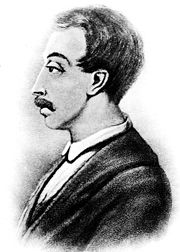
Wilhelm Küchelbecker
Encyclopedia

Tobolsk
Tobolsk is a town in Tyumen Oblast, Russia, located at the confluence of the Tobol and Irtysh Rivers. It is a historic capital of Siberia. Population: -History:...
) was a Russian
Russian literature
Russian literature refers to the literature of Russia or its émigrés, and to the Russian-language literature of several independent nations once a part of what was historically Russia or the Soviet Union...
Romantic poet and Decembrist.
Born into a noble family of Baltic Germans, he was brought up in Estonia
Estonia
Estonia , officially the Republic of Estonia , is a state in the Baltic region of Northern Europe. It is bordered to the north by the Gulf of Finland, to the west by the Baltic Sea, to the south by Latvia , and to the east by Lake Peipsi and the Russian Federation . Across the Baltic Sea lies...
and attended the Tsarskoye Selo Lyceum
Tsarskoye Selo Lyceum
The Imperial Lyceum in Tsarskoye Selo near Saint Petersburg also known historically as the Imperial Alexander Lyceum after its founder the Emperor Alexander I with the object of educating youths of the best families, who should afterwards occupy important posts in the Imperial service.Its...
together with Alexander Pushkin, with whom he became friends. In 1821 he went to Paris
Paris
Paris is the capital and largest city in France, situated on the river Seine, in northern France, at the heart of the Île-de-France region...
to deliver courses in Russian literature
Russian literature
Russian literature refers to the literature of Russia or its émigrés, and to the Russian-language literature of several independent nations once a part of what was historically Russia or the Soviet Union...
, but his activity was deemed too liberal by the Russian administration and Küchelbecker had to return to Russia.
He served in the Caucasian War
Caucasian War
The Caucasian War of 1817–1864, also known as the Russian conquest of the Caucasus was an invasion of the Caucasus by the Russian Empire which ended with the annexation of the areas of the North Caucasus to Russia...
under General Yermolov (with whose nephew he fought a duel) before launching the miscellany Mnemozina
Mnemozina
Mnemozina was a quarterly literary almanac, published in Moscow from 1824 to 1825. The full title in the Russian language is Мнемозина, собрание сочинений в стихах и прозе and was a reference to Mnemosyne, a persona in Greek mythology embodying memory...
along with Vladimir Odoevsky
Vladimir Odoevsky
Prince Vladimir Fyodorovich Odoevsky was a prominent Russian philosopher, writer, music critic, philanthropist and pedagogue. He became known as the "Russian Hoffmann" on account of his keen interest in fantasmagoric tales and musical criticism.-Life:...
in 1824. Despite his German name, Küchelbecker was an ardent Russian patriot, and though closely allied with the romanticists, he insisted on calling himself a literary conservative and a classicist. D.S. Mirsky characterizes him as "a quixotic
Quixotism
Quixotism is impracticality in pursuit of ideals, especially those ideals manifested by rash, lofty and romantic ideas or extravagantly chivalrous action. It also serves to describe an idealism without regard to practicality...
figure, ridiculous in appearance and behaviour", but his personal friends had a warm affection for him. Pushkin, who was one of his principal teasers, dedicated to him one of the most heartfelt stanzas of the Lyceum Anniversary of 1825.
As a poet, Küchelbecker had a pantheistic vision of the world but did not succeed in giving it a definite expression — his poetry is an inchoate world awaiting a builder. His best known poem is the noble elegy on the death of Pushkin, a poem closing the Golden Age of Russian Poetry
Golden Age of Russian Poetry
Golden Age of Russian Poetry is the name traditionally applied by Russian philologists to the first half of the 19th century. It is also called the Age of Pushkin, after its most significant poet...
. In his short prose piece "European Letters" (1820), a 26th-century American travels in Europe which fell back to barbarism
Barbarian
Barbarian and savage are terms used to refer to a person who is perceived to be uncivilized. The word is often used either in a general reference to a member of a nation or ethnos, typically a tribal society as seen by an urban civilization either viewed as inferior, or admired as a noble savage...
. In satiric "Land of Acephals" (fragment 1824) a protagonist travels to the Moon to find there a dystopia
Dystopia
A dystopia is the idea of a society in a repressive and controlled state, often under the guise of being utopian, as characterized in books like Brave New World and Nineteen Eighty-Four...
n state.
During the doomed Decembrist Uprising, he made an attempt on the life of the tsar's brother Michael. Küchelbecker was sentenced to corporal punishment which was commuted to imprisonment in Sveaborg, Kexholm, and other fortresses for ten years. After that he was exiled to Kurgan. He died blind in Tobolsk
Tobolsk
Tobolsk is a town in Tyumen Oblast, Russia, located at the confluence of the Tobol and Irtysh Rivers. It is a historic capital of Siberia. Population: -History:...
from tuberculosis
Tuberculosis
Tuberculosis, MTB, or TB is a common, and in many cases lethal, infectious disease caused by various strains of mycobacteria, usually Mycobacterium tuberculosis. Tuberculosis usually attacks the lungs but can also affect other parts of the body...
. His most famous biography, Kyukhlya, was written by Yury Tynyanov
Yury Tynyanov
Yury Nikolaevich Tynyanov was a famous Soviet/Russian writer, literary critic, translator, scholar and screenwriter. He was an authority on Pushkin and an important member of the Russian Formalist school.-Life and work:...
; its publication in 1925 marked a resurgence of interest in Küchelbecker and his art.

